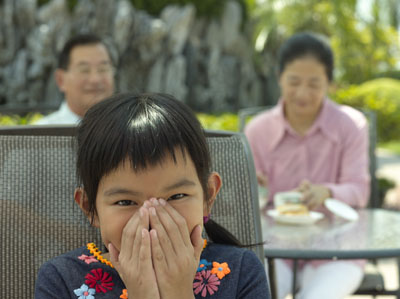Kids and Culture
January 6, 2011 - How do cultural norms and values interact with the development of social and emotional functioning in children?
That’s the big question Professor Xinyin Chen, who came to GSE in 2010, seeks to answer in his research.
“I want to look at whether behaviors have the same meanings in different cultures,” Chen says, “at whether they are perceived and valued the same way.”
 Aggression is a case in point. In the United States, Chen says, aggressive children may have run-ins with other children and with authority figures, but their aggressive behavior doesn’t make them feel bad about themselves. In other cultures, however, such children often feel miserable—that is, they develop what psychologists call internalizing problems.
Aggression is a case in point. In the United States, Chen says, aggressive children may have run-ins with other children and with authority figures, but their aggressive behavior doesn’t make them feel bad about themselves. In other cultures, however, such children often feel miserable—that is, they develop what psychologists call internalizing problems.
Or take shyness, which has been the focus of a considerable portion of Chen’s research. According to Chen, who has studied shy children in Canada, the U.S. and China, among other places, shyness has very different meanings in North American culture and in Chinese culture.
In North America, shyness typically affects children’s social and emotional adjustment, and shy children have problems in school. Other children shun them, teachers see them as incompetent, and they feel incompetent themselves, among other psychological problems.
In China, on the other hand, shy children are liked by their peers and their teachers. They generally do well in school, their psychological development is positive, and, in fact, they become leaders in the classroom.
But, as Chen points out, culture is never static. In particular, China’s massive economic reforms have produced two decades of rapid cultural change—providing Chen a laboratory in which to test how such change can intersect with children’s social and emotional development.
With the move to a market-oriented, capitalist economy has come a new set of values, at least in urban areas. To succeed in the new China, children must be much more competitive, autonomous and assertive, and these traits are now appreciated and valued much more than in the past.
What Chen has found is that in urban areas, where the changes have been most far-reaching, shy children now have all the developmental, psychological and behavioral problems that their counterparts in the U.S. experience. However, in rural areas—where, despite rapid economic growth, the vast majority of China’s people still live—shy children still do well developmentally.
In China’s cities today, Chen says, “Social expectations are different; the whole cultural environment is different. It’s part of globalization and the introduction of Western ideologies—a new trend.”
Chen plans to use longitudinal studies to continue tracking the urban/rural divide in China and how macroeconomic change affects children’s development, as well as to collaborate with others to look at this issue across different cultures.
He also hopes to more systematically study social and emotional development among U.S. children and families from different ethnic backgrounds. “I am interested in how children with diverse backgrounds function in social context,” Chen says, “in how they form relationships within and across ethnic groups.” In particular, he wants to study how immigrant children form social networks, and how those networks affect their psychological and social/cognitive adjustment.
At GSE, Chen says, he has found the ideal setting for his work.
First, he says, GSE offers a robust interdisciplinary environment, which is crucial to someone who does interdisciplinary studies of human development.
Second, there are many faculty in the wider Penn community who are working on the same issues that interest him; he’s talking with scholars in disciplines ranging from nursing to sociology about collaborating on joint projects.
And finally, Chen says, “I’m finding great students here; the students are extremely smart and amazing.”
